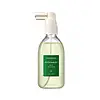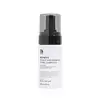What's inside
What's inside
 Key Ingredients
Key Ingredients

 Benefits
Benefits

 Concerns
Concerns

 Ingredients Side-by-side
Ingredients Side-by-side

Alcohol Denat.
AntimicrobialRosmarinus Officinalis Leaf Extract
AntimicrobialPinus Densiflora Leaf Extract
AntimicrobialWater
Skin ConditioningRosmarinus Officinalis Leaf Oil
MaskingZingiber Officinale Root Extract
MaskingBifida Ferment Lysate
Skin ConditioningLactobacillus Ferment Lysate
Skin ConditioningCaffeine
Skin ConditioningPanthenol
Skin ConditioningBiotin
AntiseborrhoeicThiamine Hcl
MaskingPyridoxine Hcl
Skin ConditioningAscorbic Acid
AntioxidantMenadione
MaskingRiboflavin
Cosmetic ColorantOryza Sativa Extract
AbsorbentGlycine Soja Seed Extract
Skin ConditioningSesamum Indicum Seed Extract
Skin ConditioningSolanum Melongena Fruit Extract
Skin ConditioningMorus Alba Fruit Extract
AntioxidantPiper Nigrum Seed Extract
RefreshingSalicylic Acid
MaskingLavandula Angustifolia Oil
MaskingMenthol
MaskingGlycerin
HumectantEthylhexylglycerin
Skin ConditioningCitrus Aurantium Dulcis Peel Oil
MaskingMentha Viridis Leaf Oil
AstringentMelia Azadirachta Leaf Extract
Skin ConditioningMelia Azadirachta Flower Extract
Skin ConditioningGeraniol
PerfumingLimonene
PerfumingLinalool
Perfuming1,2-Hexanediol
Skin ConditioningBenzyl Glycol
SolventAlcohol Denat., Rosmarinus Officinalis Leaf Extract, Pinus Densiflora Leaf Extract, Water, Rosmarinus Officinalis Leaf Oil, Zingiber Officinale Root Extract, Bifida Ferment Lysate, Lactobacillus Ferment Lysate, Caffeine, Panthenol, Biotin, Thiamine Hcl, Pyridoxine Hcl, Ascorbic Acid, Menadione, Riboflavin, Oryza Sativa Extract, Glycine Soja Seed Extract, Sesamum Indicum Seed Extract, Solanum Melongena Fruit Extract, Morus Alba Fruit Extract, Piper Nigrum Seed Extract, Salicylic Acid, Lavandula Angustifolia Oil, Menthol, Glycerin, Ethylhexylglycerin, Citrus Aurantium Dulcis Peel Oil, Mentha Viridis Leaf Oil, Melia Azadirachta Leaf Extract, Melia Azadirachta Flower Extract, Geraniol, Limonene, Linalool, 1,2-Hexanediol, Benzyl Glycol
Lactobacillus/Leaf Ferment Filtrate 60%
Skin ConditioningWater
Skin ConditioningButylene Glycol
HumectantSaccharomyces Cerevisiae Extract
Skin Conditioning1,2-Hexanediol
Skin ConditioningEcklonia Cava Extract
Skin ConditioningC12-13 Alketh-9
EmulsifyingGlycerin
HumectantPropanediol
SolventPanthenol
Skin ConditioningPolyglyceryl-10 Laurate
Skin ConditioningArginine
MaskingNiacinamide
SmoothingAllantoin
Skin ConditioningBetaine Salicylate
AntimicrobialCaffeine
Skin ConditioningHydrolyzed Silk
HumectantCoptis Japonica Root Extract
Skin ConditioningMorus Alba Bark Extract
Skin ConditioningSophora Flavescens Root Extract
AntioxidantScutellaria Baicalensis Root Extract
AstringentSodium Phytate
Alteromonas Ferment Extract
Skin ConditioningGlycine
BufferingBetaine
HumectantPalmitoyl Tripeptide-5
Skin ConditioningAcetyl Hexapeptide-8
HumectantHouttuynia Cordata Extract
Skin ConditioningCamellia Sinensis Leaf Extract
AntimicrobialPerilla Frutescens Leaf Extract
MaskingGlycine Max Seed Extract
Skin ConditioningPolyglyceryl-10 Stearate
Skin ConditioningSerine
MaskingGlutamic Acid
HumectantAspartic Acid
MaskingLeucine
Skin ConditioningAlanine
MaskingLysine
Skin ConditioningTyrosine
MaskingPhenylalanine
MaskingValine
MaskingThreonine
Proline
Skin ConditioningIsoleucine
Skin ConditioningBiotin
AntiseborrhoeicHistidine
HumectantCysteine
AntioxidantMethionine
Skin ConditioningSodium Ascorbyl Phosphate
AntioxidantBeta-Glucan
Skin ConditioningFolic Acid
Skin ConditioningPyridoxine
Skin ConditioningTocopherol
AntioxidantCyanocobalamin
Skin ConditioningBeta-Carotene
Skin ConditioningLinoleic Acid
CleansingThiamine Hcl
MaskingRiboflavin
Cosmetic ColorantMenthol
MaskingMenthyl Lactate
MaskingEthylhexylglycerin
Skin ConditioningCitric Acid
BufferingSodium Citrate
BufferingHydrogenated Lecithin
EmulsifyingCaprylyl Glycol
EmollientMelaleuca Alternifolia Leaf Oil
AntioxidantMentha Piperita Oil
MaskingParfum
MaskingLactobacillus/Leaf Ferment Filtrate 60%, Water, Butylene Glycol, Saccharomyces Cerevisiae Extract, 1,2-Hexanediol, Ecklonia Cava Extract, C12-13 Alketh-9, Glycerin, Propanediol, Panthenol, Polyglyceryl-10 Laurate, Arginine, Niacinamide, Allantoin, Betaine Salicylate, Caffeine, Hydrolyzed Silk, Coptis Japonica Root Extract, Morus Alba Bark Extract, Sophora Flavescens Root Extract, Scutellaria Baicalensis Root Extract, Sodium Phytate, Alteromonas Ferment Extract, Glycine, Betaine, Palmitoyl Tripeptide-5, Acetyl Hexapeptide-8, Houttuynia Cordata Extract, Camellia Sinensis Leaf Extract, Perilla Frutescens Leaf Extract, Glycine Max Seed Extract, Polyglyceryl-10 Stearate, Serine, Glutamic Acid, Aspartic Acid, Leucine, Alanine, Lysine, Tyrosine, Phenylalanine, Valine, Threonine, Proline, Isoleucine, Biotin, Histidine, Cysteine, Methionine, Sodium Ascorbyl Phosphate, Beta-Glucan, Folic Acid, Pyridoxine, Tocopherol, Cyanocobalamin, Beta-Carotene, Linoleic Acid, Thiamine Hcl, Riboflavin, Menthol, Menthyl Lactate, Ethylhexylglycerin, Citric Acid, Sodium Citrate, Hydrogenated Lecithin, Caprylyl Glycol, Melaleuca Alternifolia Leaf Oil, Mentha Piperita Oil, Parfum
 Reviews
Reviews

Alternatives
Ingredients Explained
These ingredients are found in both products.
Ingredients higher up in an ingredient list are typically present in a larger amount.
1,2-Hexanediol is a synthetic liquid and another multi-functional powerhouse.
It is a:
- Humectant, drawing moisture into the skin
- Emollient, helping to soften skin
- Solvent, dispersing and stabilizing formulas
- Preservative booster, enhancing the antimicrobial activity of other preservatives
Biotin is a B vitamin that is naturally produced by our bodies. It is also called Vitamin H.
Our bodies use biotin in the metabolism process. It also helps our bodies use enzymes and move nutrients around. A biotin deficiency can lead to brittle hair and nails.
More research is needed on applying biotin topically. However, taking biotin orally has been shown to help nourish the skin, hair, and nails. They play a role in forming skin-hydrating fatty acids.
Biotin is water-soluble. It can be found in foods such as fish, eggs, dairy, nuts, and meat. Vitamin H stands for "haar" and "haut". These are the German words for hair and skin.
Learn more about BiotinCaffeine is most associated with coffee, tea, and cacao. In skincare, it helps with calming inflammation and is rich in antioxidants.
While caffeine is used to treat cellulite and and dark circles, further studies are needed to prove this. It has been believed to help with these skin conditions due to its ability to dilate blood vessels and increase blood flow.
Some studies are looking into caffeine's ability to protect against UV rays.
Learn more about CaffeineEthylhexylglycerin (we can't pronounce this either) is commonly used as a preservative and skin softener. It is derived from glyceryl.
You might see Ethylhexylglycerin often paired with other preservatives such as phenoxyethanol. Ethylhexylglycerin has been found to increase the effectiveness of these other preservatives.
Glycerin is already naturally found in your skin. It helps moisturize and protect your skin.
A study from 2016 found glycerin to be more effective as a humectant than AHAs and hyaluronic acid.
As a humectant, it helps the skin stay hydrated by pulling moisture to your skin. The low molecular weight of glycerin allows it to pull moisture into the deeper layers of your skin.
Hydrated skin improves your skin barrier; Your skin barrier helps protect against irritants and bacteria.
Glycerin has also been found to have antimicrobial and antiviral properties. Due to these properties, glycerin is often used in wound and burn treatments.
In cosmetics, glycerin is usually derived from plants such as soybean or palm. However, it can also be sourced from animals, such as tallow or animal fat.
This ingredient is organic, colorless, odorless, and non-toxic.
Glycerin is the name for this ingredient in American English. British English uses Glycerol/Glycerine.
Learn more about GlycerinMenthol is a compound found in mint plants, such as peppermint. In its pure form, it is a clear crystalline substance.
Menthol is known for its cooling sensation; however, the cooling is actually from your skin being sensitized. Menthol can worsen rosacea. We recommend speaking with a professional if you have concerns.
Menthol also has antimicrobial properties.
Learn more about MentholPanthenol is a common ingredient that helps hydrate and soothe the skin. It is found naturally in our skin and hair.
There are two forms of panthenol: D and L.
D-panthenol is also known as dexpanthenol. Most cosmetics use dexpanthenol or a mixture of D and L-panthenol.
Panthenol is famous due to its ability to go deeper into the skin's layers. Using this ingredient has numerous pros (and no cons):
Like hyaluronic acid, panthenol is a humectant. Humectants are able to bind and hold large amounts of water to keep skin hydrated.
This ingredient works well for wound healing. It works by increasing tissue in the wound and helps close open wounds.
Once oxidized, panthenol converts to pantothenic acid. Panthothenic acid is found in all living cells.
This ingredient is also referred to as pro-vitamin B5.
Learn more about PanthenolRiboflavin is Vitamin B2. Our bodies use riboflavin in the creation of skin, digestive tract lining, and blood cells.
Riboflavin is naturally found in Royal Jelly.
Foods rich in riboflavin include eggs, milk, organ meat, cheese, and yogurt.
Learn more about other types of Vitamin B:
Learn more about RiboflavinThiamine Hcl is Vitamin B1. The HCL stands for hydrochloride. Thiamine HCL is created using thiamine chloride and hydrochloric acid.
Our bodies use Thiamine HCL for aerobic metabolism, cell growth, and transmission of nerve impulses.
Learn more about Vitamin B in skincare:
Learn more about Thiamine HclWater. It's the most common cosmetic ingredient of all. You'll usually see it at the top of ingredient lists, meaning that it makes up the largest part of the product.
So why is it so popular? Water most often acts as a solvent - this means that it helps dissolve other ingredients into the formulation.
You'll also recognize water as that liquid we all need to stay alive. If you see this, drink a glass of water. Stay hydrated!
Learn more about Water